人教版新课标英语必修一Unit 2 English around the world Warm up 课件(共37张PPT)
文档属性
| 名称 | 人教版新课标英语必修一Unit 2 English around the world Warm up 课件(共37张PPT) | 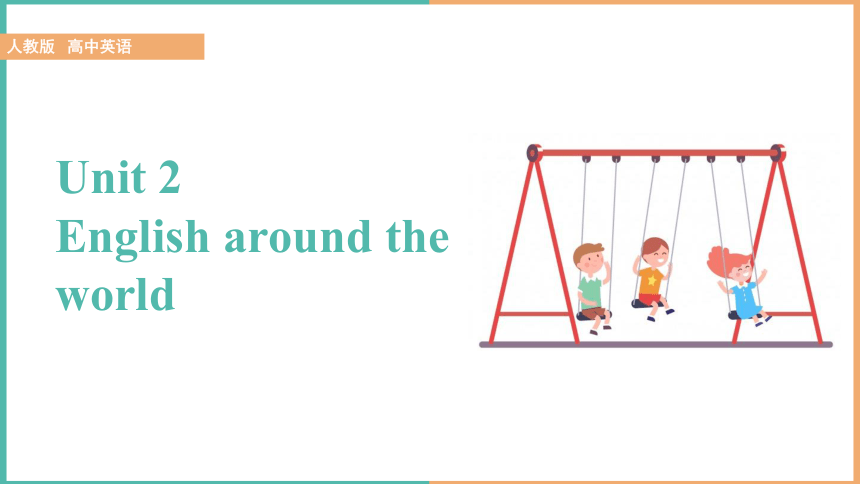 | |
| 格式 | pptx | ||
| 文件大小 | 1.8MB | ||
| 资源类型 | 教案 | ||
| 版本资源 | 人教版(新课程标准) | ||
| 科目 | 英语 | ||
| 更新时间 | 2021-02-09 18:25:31 | ||
图片预览



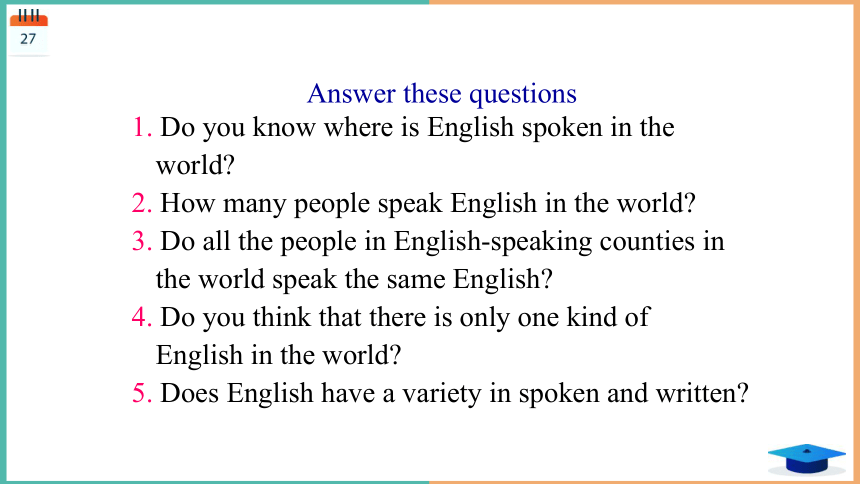
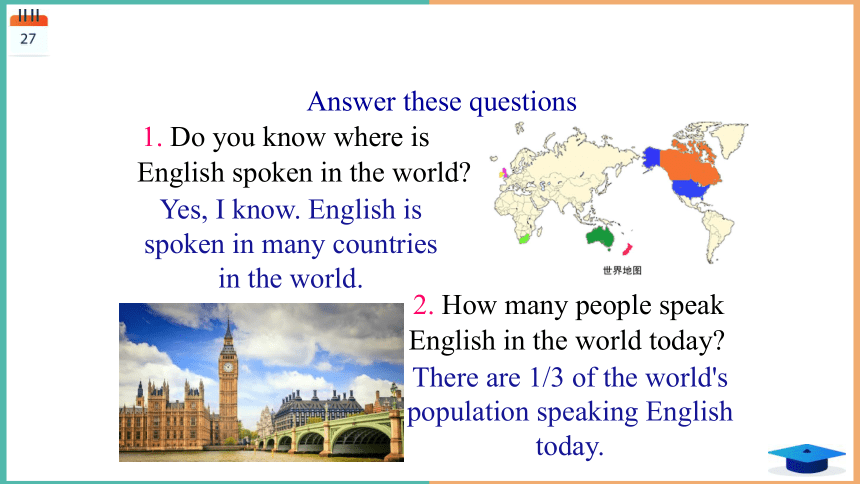
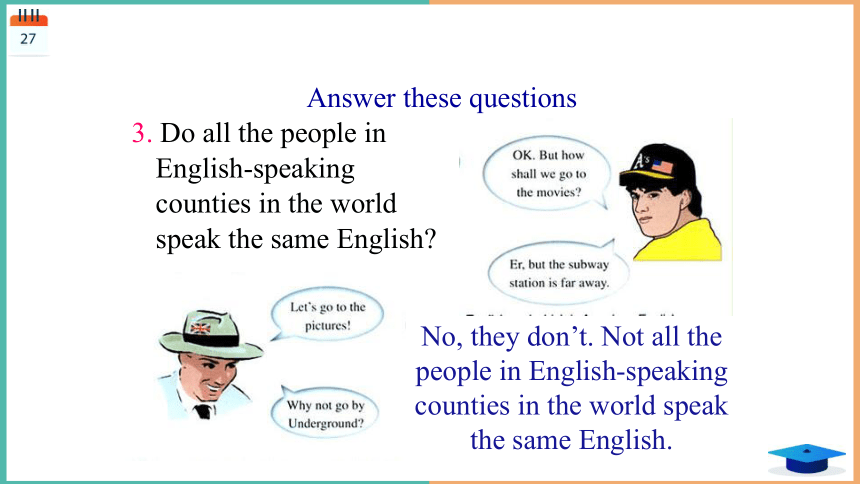
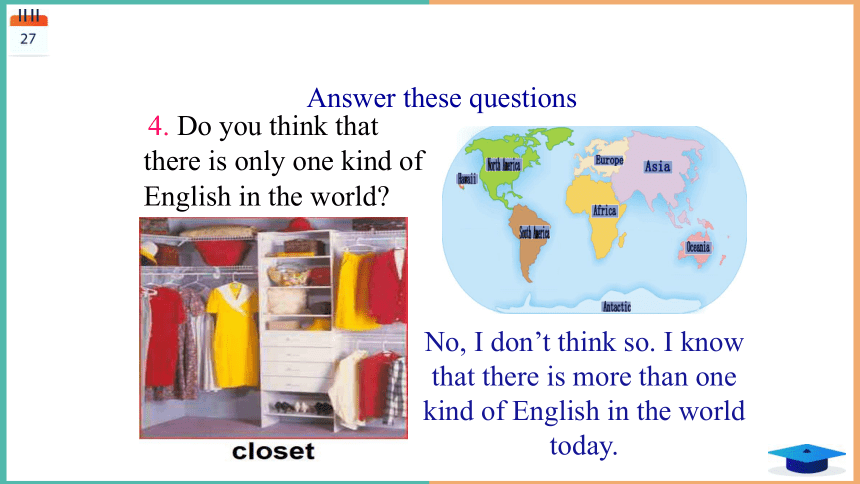
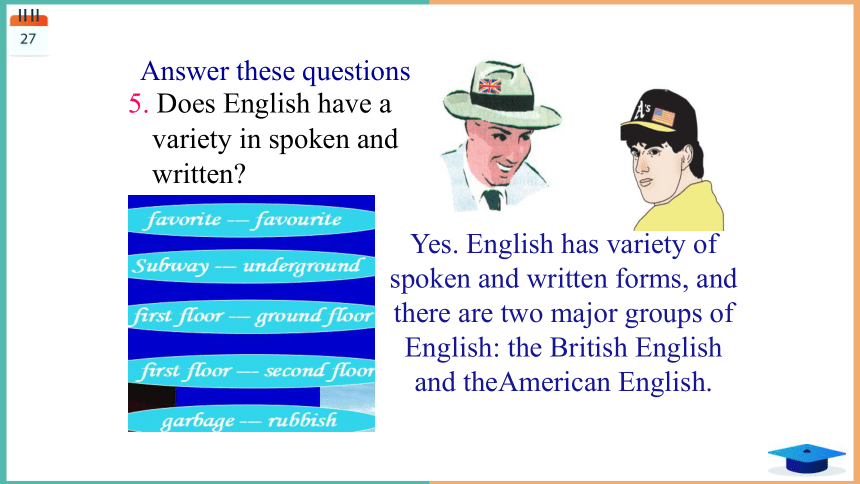

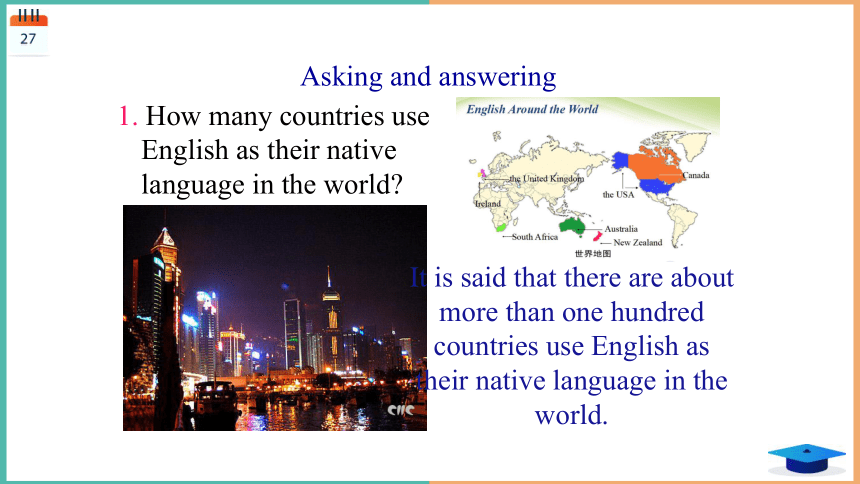

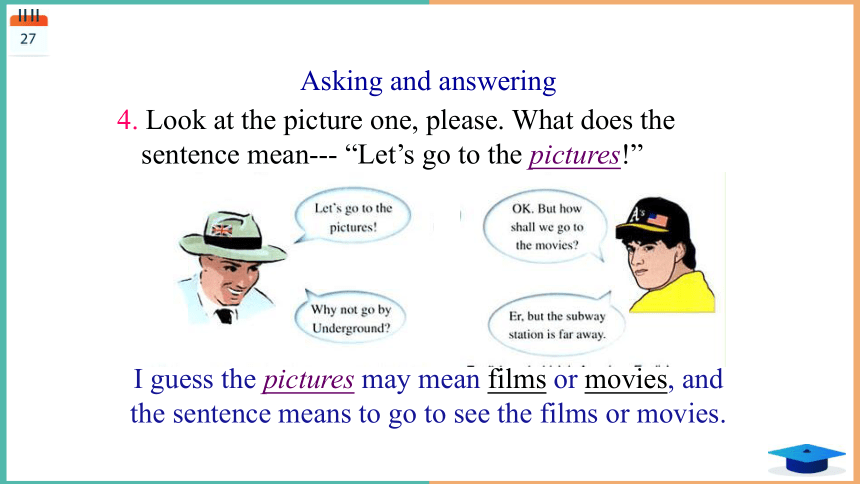
文档简介
人教版 高中英语
Unit 2
English around the world
Look at the pictures please !
Think over what is the passage about.
Look at the pictures please !
Think over what is the passage about.
1. Do you know where is English spoken in the world?
2. How many people speak English in the world?
3. Do all the people in English-speaking counties in the world speak the same English?
4. Do you think that there is only one kind of English in the world?
5. Does English have a variety in spoken and written?
Answer these questions
Answer these questions
Yes, I know. English is spoken in many countries in the world.
There are 1/3 of the world's population speaking English today.
2. How many people speak English in the world today?
1. Do you know where is English spoken in the world?
3. Do all the people in English-speaking counties in the world speak the same English?
Answer these questions
No, they don’t. Not all the people in English-speaking counties in the world speak the same English.
4. Do you think that there is only one kind of English in the world?
Answer these questions
No, I don’t think so. I know that there is more than one kind of English in the world today.
5. Does English have a variety in spoken and written?
Yes. English has variety of spoken and written forms, and there are two major groups of English: the British English and theAmerican English.
Answer these questions
The topic -- the differences between British English and American English.
1. How many countries use English as their native language in the world?
2. Do they speak the same English?
3. What are the differences between British English and American English?
4. Look at the picture one, please. What does the sentence mean--- “Let’s go to the pictures!”?
5. Look at the pictures one and two. Who is British and who is American
1. How many countries use English as their native language in the world?
Asking and answering
It is said that there are about more than one hundred countries use English as their native language in the world.
2. Do they speak the same English?
No, they don’t. They don’t speak the same English
Asking and answering
The differences between British English and American English are in spoken and written forms.
3. What are the differences between British English and American English?
Asking and answering
I guess the pictures may mean films or movies, and the sentence means to go to see the films or movies.
4. Look at the picture one, please. What does the sentence mean--- “Let’s go to the pictures!”
5. Look at the pictures one and two. Who is British and who is American?
Asking and answering
It's easy to recognize according to their hats. The man in blue is British and the man in yellow is American.
The sample of the :
Just now, we discussed the English language. English is spoken in many countries in the world today. There are about more than one hundred countries use English as their native language in the world, and it is said that there are 1/3 of the world's population speaking English today, but they don’t speak the same English.
The sample of the :
English has a variety of spoken and written forms. And there are two major groups of English: the British English and the American English. The differences between British English and American English are in spoken and written forms.
The sample of the :
The word, pictures, may mean films or movies, the word, favourite, may be written in favorite, for examples.
Therefor, we should pay attention to the differences between British English and American English when we use the English language.
Guess which of the following words is British English and which is American English.
apartment/flat, bathroom/toilet, can/tin,
candy/sweet, elevator/lift, fall/autumn,
game/match, line/queue, penal/pen friend,
mad/angry, mail/post, mom/mum, movie/film, pants/trousers, repair/mend,
sick/ill, eraser/rubber, cookie/biscuit,
Guess which of the following words is British English and which is American English.
gas/petrol, crazy/mad, favorite/favourite,
in a team/on a team, drugstore/chemist’s,
first floor/ground floor, first floor/second floor, garbage/rubbish, center/centre, fall/autumn
Look at the following examples:
{5C22544A-7EE6-4342-B048-85BDC9FD1C3A}American English
British English
college
university
transportation
transport
gasoline
petrol
highway
main road
fall
autumn
subway
underground
garbage
rubbish
sidewalk
pavement
Look at the following examples:
{5C22544A-7EE6-4342-B048-85BDC9FD1C3A}American English
British English
truck
lorry
apartment
flat
high school
secondary school
elevator
lift
semester
term
vacation
holiday
closet
wardrobe
first floor
ground floor
the key words and expressions
1. subway n. 地铁,地下人行道
I don't ride the subway late at night.
我深夜不坐地铁。
It's only five minutes walk to the subway station.
只要走五分钟就到地铁站了。
I happened to meet an old friend on the subway.
我在地铁里碰巧遇见了一位老朋友。
the key words and expressions
2. elevator n. 电梯,升降机,直升机
The elevator creaked to a halt at the ground floor. 电梯嘎吱一声停在了一层。
The elevator descended slowly to the ground floor. 电梯缓缓地降到底楼。
In England they call an elevator man a lift-man.
英国人把开电梯的人称作电梯工。
the key words and expressions
3. petrol n. 汽油
The engine of your car can run on 72 petrol.
你汽车的发动机适合烧72号汽油。
4. gas n. 汽油,气体,煤气,毒气
Coal is actually cheaper than gas.
煤实际上比煤气便宜。
This corner would make a good location for a gas station. 这个拐角将是设立一个加油站的好地点。
The gas is seeping out of the rocks.
气体正从岩石中渗出。
the key words and expressions
5. gasoline n. 汽油
We stopped at the filling station because we needed gasoline.
我们在加油站停下来,因我们需要加油。
Gasoline is distilled from crude oil.
汽油是从原油中提炼出来的。
Gasoline was rationed during the war.
战时汽油实行配售。
the key words and expressions
6. official a. 官方的,正式的,公务的
Taking her with me on official occasions has been a challenge.
带着她出席正式场合对我来说一直是个挑战。
The first official results will be announced tomorrow. 第一批官方结果将于明天宣布。
An official announcement is expected in the next few days. 预计过几天会发布一项正式声明。
the key words and expressions
7. native a. 本国的;本地的;
n. 本地人;本国人
She spoke not only her native language, Swedish, but also English and French.
她不仅讲自己的母语瑞典语,还讲英语和法语。
French is not my native tongue.
法语不是我的母语。
I'm a native of this place.; I was born here.
我是本地人。
the key words and expressions
8. apartment n. 公寓住宅,房间,寓所,
住房,公寓楼,单元住宅
Here's my apartment.
我的公寓到了。
He went to Toronto, where he leased an apartment.
他去了多伦多,在那儿租了一间公寓。
I've got a pleasant little apartment.
我有一套舒适的小公寓。
the key words and expressions
9. rubber n. 橡胶,橡皮
You can erase pencil marks with a rubber.
你可以用橡皮擦掉铅笔记号。
Rubber is an elastic material.
橡胶是一种弹性材料。
10. eraser n. 橡皮擦,黑板擦
I need a pen and an eraser.
我需要一支笔和一个橡皮擦。
My ruler and eraser please.
请把我的尺和橡皮给我。
the key words and expressions
11. vacation n. 假期,休假
We'll start another winter vacation.
我们又该放寒假了。
They planned a late summer vacation in Europe.
他们打算夏末去欧洲度假。
We must decide between going home and staying at school during this winter vacation.
我们必须决定寒假期间是回家还是留校。
the key words and expressions
12. transport n. 运输,运输工具
v. 运送,运输
transportation n. 运输,运输工具/系统
Have you got your own transport?
你有自己的交通工具吗?
Which type of transport do you prefer?
你更喜欢哪种类型的代步工具?
The company will provide transportation.
公司会提供交通工具
the key words and expressions
13. pavement n. 人行道,铺过的路面
He was hurrying along the pavement.
他在人行道上疾行。
She stamped her feet on the pavement to keep out the cold.
她在人行道上跺着双脚取暖。
Don't Park bicycles on the pavement.
人行道上不准停放自行车。
the key words and expressions
14. semester n. 学期,半学年
She got good grades last semester.
上学期她的成绩优良。
I take many courses this semester.
这学期我选了许多课。
This semester, I want to be friends and every student.
这个学期,我希望能和每一个同学做朋友。
the key words and expressions
15. closet n. 壁橱,密室,贮藏室,盥洗室
He ensconced himself in the closet in order to eavesdrop.
他藏在壁橱里,以便偷听。
He went to the water closet.
他去洗手间了。
I sorted out all the stuff in the closet.
我把衣柜里的东西都整理了一下。
the key words and expressions
16. wardrobe n. 行头,衣柜,
衣橱,藏衣室
In the wardrobe department were rows of costumes.
戏装部有一排排的戏装。
The wardrobe was very deep.
这个衣柜很深。
She stuffed her clothes in the wardrobe.
她把衣服塞进衣橱。
1. Discussed the differences between British English and American English.
2. We learned that English has a variety of spoken and written forms.
3. We know that the English native-speakers speak different English in different countries.
4. We’ve learned some words and expressions.
5. We’ve learned to recognize the differences between some Br. English words and Am. English words.
We've done the following in the class:
Homework
1. the usage of the words and phrases we ed today with a dictionary or on line.
2. Finish the exercises and prepare the reading passage.
人教版 高中英语
THANKS
Unit 2
English around the world
Look at the pictures please !
Think over what is the passage about.
Look at the pictures please !
Think over what is the passage about.
1. Do you know where is English spoken in the world?
2. How many people speak English in the world?
3. Do all the people in English-speaking counties in the world speak the same English?
4. Do you think that there is only one kind of English in the world?
5. Does English have a variety in spoken and written?
Answer these questions
Answer these questions
Yes, I know. English is spoken in many countries in the world.
There are 1/3 of the world's population speaking English today.
2. How many people speak English in the world today?
1. Do you know where is English spoken in the world?
3. Do all the people in English-speaking counties in the world speak the same English?
Answer these questions
No, they don’t. Not all the people in English-speaking counties in the world speak the same English.
4. Do you think that there is only one kind of English in the world?
Answer these questions
No, I don’t think so. I know that there is more than one kind of English in the world today.
5. Does English have a variety in spoken and written?
Yes. English has variety of spoken and written forms, and there are two major groups of English: the British English and theAmerican English.
Answer these questions
The topic -- the differences between British English and American English.
1. How many countries use English as their native language in the world?
2. Do they speak the same English?
3. What are the differences between British English and American English?
4. Look at the picture one, please. What does the sentence mean--- “Let’s go to the pictures!”?
5. Look at the pictures one and two. Who is British and who is American
1. How many countries use English as their native language in the world?
Asking and answering
It is said that there are about more than one hundred countries use English as their native language in the world.
2. Do they speak the same English?
No, they don’t. They don’t speak the same English
Asking and answering
The differences between British English and American English are in spoken and written forms.
3. What are the differences between British English and American English?
Asking and answering
I guess the pictures may mean films or movies, and the sentence means to go to see the films or movies.
4. Look at the picture one, please. What does the sentence mean--- “Let’s go to the pictures!”
5. Look at the pictures one and two. Who is British and who is American?
Asking and answering
It's easy to recognize according to their hats. The man in blue is British and the man in yellow is American.
The sample of the :
Just now, we discussed the English language. English is spoken in many countries in the world today. There are about more than one hundred countries use English as their native language in the world, and it is said that there are 1/3 of the world's population speaking English today, but they don’t speak the same English.
The sample of the :
English has a variety of spoken and written forms. And there are two major groups of English: the British English and the American English. The differences between British English and American English are in spoken and written forms.
The sample of the :
The word, pictures, may mean films or movies, the word, favourite, may be written in favorite, for examples.
Therefor, we should pay attention to the differences between British English and American English when we use the English language.
Guess which of the following words is British English and which is American English.
apartment/flat, bathroom/toilet, can/tin,
candy/sweet, elevator/lift, fall/autumn,
game/match, line/queue, penal/pen friend,
mad/angry, mail/post, mom/mum, movie/film, pants/trousers, repair/mend,
sick/ill, eraser/rubber, cookie/biscuit,
Guess which of the following words is British English and which is American English.
gas/petrol, crazy/mad, favorite/favourite,
in a team/on a team, drugstore/chemist’s,
first floor/ground floor, first floor/second floor, garbage/rubbish, center/centre, fall/autumn
Look at the following examples:
{5C22544A-7EE6-4342-B048-85BDC9FD1C3A}American English
British English
college
university
transportation
transport
gasoline
petrol
highway
main road
fall
autumn
subway
underground
garbage
rubbish
sidewalk
pavement
Look at the following examples:
{5C22544A-7EE6-4342-B048-85BDC9FD1C3A}American English
British English
truck
lorry
apartment
flat
high school
secondary school
elevator
lift
semester
term
vacation
holiday
closet
wardrobe
first floor
ground floor
the key words and expressions
1. subway n. 地铁,地下人行道
I don't ride the subway late at night.
我深夜不坐地铁。
It's only five minutes walk to the subway station.
只要走五分钟就到地铁站了。
I happened to meet an old friend on the subway.
我在地铁里碰巧遇见了一位老朋友。
the key words and expressions
2. elevator n. 电梯,升降机,直升机
The elevator creaked to a halt at the ground floor. 电梯嘎吱一声停在了一层。
The elevator descended slowly to the ground floor. 电梯缓缓地降到底楼。
In England they call an elevator man a lift-man.
英国人把开电梯的人称作电梯工。
the key words and expressions
3. petrol n. 汽油
The engine of your car can run on 72 petrol.
你汽车的发动机适合烧72号汽油。
4. gas n. 汽油,气体,煤气,毒气
Coal is actually cheaper than gas.
煤实际上比煤气便宜。
This corner would make a good location for a gas station. 这个拐角将是设立一个加油站的好地点。
The gas is seeping out of the rocks.
气体正从岩石中渗出。
the key words and expressions
5. gasoline n. 汽油
We stopped at the filling station because we needed gasoline.
我们在加油站停下来,因我们需要加油。
Gasoline is distilled from crude oil.
汽油是从原油中提炼出来的。
Gasoline was rationed during the war.
战时汽油实行配售。
the key words and expressions
6. official a. 官方的,正式的,公务的
Taking her with me on official occasions has been a challenge.
带着她出席正式场合对我来说一直是个挑战。
The first official results will be announced tomorrow. 第一批官方结果将于明天宣布。
An official announcement is expected in the next few days. 预计过几天会发布一项正式声明。
the key words and expressions
7. native a. 本国的;本地的;
n. 本地人;本国人
She spoke not only her native language, Swedish, but also English and French.
她不仅讲自己的母语瑞典语,还讲英语和法语。
French is not my native tongue.
法语不是我的母语。
I'm a native of this place.; I was born here.
我是本地人。
the key words and expressions
8. apartment n. 公寓住宅,房间,寓所,
住房,公寓楼,单元住宅
Here's my apartment.
我的公寓到了。
He went to Toronto, where he leased an apartment.
他去了多伦多,在那儿租了一间公寓。
I've got a pleasant little apartment.
我有一套舒适的小公寓。
the key words and expressions
9. rubber n. 橡胶,橡皮
You can erase pencil marks with a rubber.
你可以用橡皮擦掉铅笔记号。
Rubber is an elastic material.
橡胶是一种弹性材料。
10. eraser n. 橡皮擦,黑板擦
I need a pen and an eraser.
我需要一支笔和一个橡皮擦。
My ruler and eraser please.
请把我的尺和橡皮给我。
the key words and expressions
11. vacation n. 假期,休假
We'll start another winter vacation.
我们又该放寒假了。
They planned a late summer vacation in Europe.
他们打算夏末去欧洲度假。
We must decide between going home and staying at school during this winter vacation.
我们必须决定寒假期间是回家还是留校。
the key words and expressions
12. transport n. 运输,运输工具
v. 运送,运输
transportation n. 运输,运输工具/系统
Have you got your own transport?
你有自己的交通工具吗?
Which type of transport do you prefer?
你更喜欢哪种类型的代步工具?
The company will provide transportation.
公司会提供交通工具
the key words and expressions
13. pavement n. 人行道,铺过的路面
He was hurrying along the pavement.
他在人行道上疾行。
She stamped her feet on the pavement to keep out the cold.
她在人行道上跺着双脚取暖。
Don't Park bicycles on the pavement.
人行道上不准停放自行车。
the key words and expressions
14. semester n. 学期,半学年
She got good grades last semester.
上学期她的成绩优良。
I take many courses this semester.
这学期我选了许多课。
This semester, I want to be friends and every student.
这个学期,我希望能和每一个同学做朋友。
the key words and expressions
15. closet n. 壁橱,密室,贮藏室,盥洗室
He ensconced himself in the closet in order to eavesdrop.
他藏在壁橱里,以便偷听。
He went to the water closet.
他去洗手间了。
I sorted out all the stuff in the closet.
我把衣柜里的东西都整理了一下。
the key words and expressions
16. wardrobe n. 行头,衣柜,
衣橱,藏衣室
In the wardrobe department were rows of costumes.
戏装部有一排排的戏装。
The wardrobe was very deep.
这个衣柜很深。
She stuffed her clothes in the wardrobe.
她把衣服塞进衣橱。
1. Discussed the differences between British English and American English.
2. We learned that English has a variety of spoken and written forms.
3. We know that the English native-speakers speak different English in different countries.
4. We’ve learned some words and expressions.
5. We’ve learned to recognize the differences between some Br. English words and Am. English words.
We've done the following in the class:
Homework
1. the usage of the words and phrases we ed today with a dictionary or on line.
2. Finish the exercises and prepare the reading passage.
人教版 高中英语
THANKS
